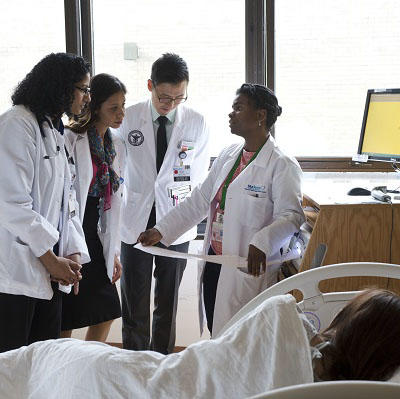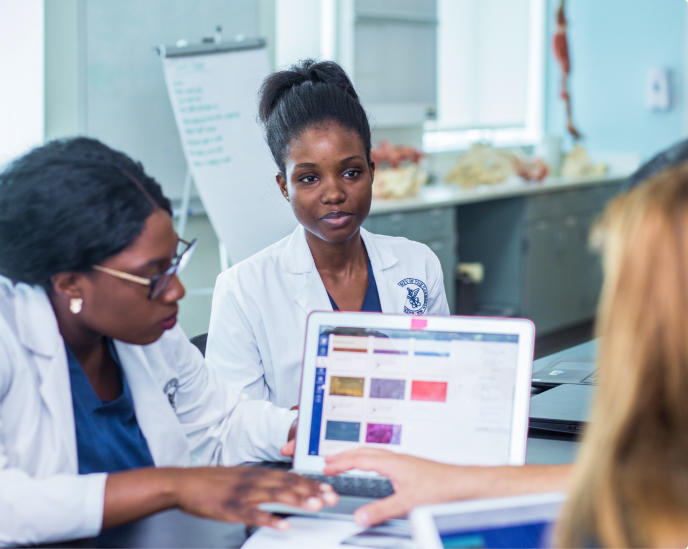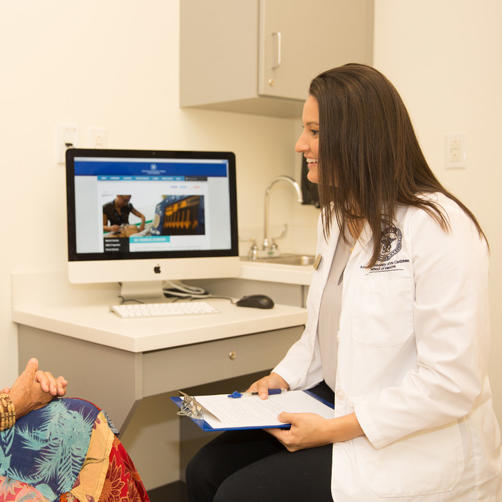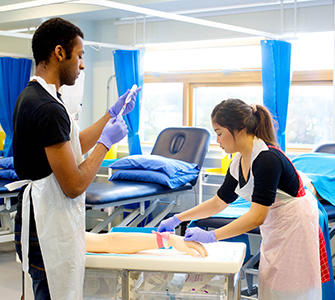The second phase of medical school marks the transition from theory to practice. During this time, students receive rotation assignments and perform as a member of the healthcare team.
WONDERING WHERE YOU STAND AS A MEDICAL SCHOOL CANDIDATE?
Clinical rotations, or clerkships, are essential. They provide a safe space to care for patients. As a result, students build confidence and competency while working with a medical team. Most importantly, the hands-on experience lays the foundation for a successful medical career.
WHAT ARE CLINICAL ROTATIONS?
Clinical rotations in medical school are assigned shifts at an approved healthcare site. Once assigned to a site, students deliver supervised care individually and as a team. Tasks such as patient interviews, examinations, lab data reviews, and team discussions are common practice.
Each clerkship lasts several weeks at one site before students rotate to another. Therefore, students have a unique opportunity to take a deep dive into each rotation’s discipline. At the end of the rotation, clinical instructors evaluate performance. Students must also successfully pass standardized tests—called shelf exams—to advance.
TYPES OF CLINICAL ROTATIONS
Generally, students complete 80 weeks of clinical rotations in medical school. There are two types of clinical rotations: core and elective. Although specific core rotations are required, students may request different elective rotations.
Core clinical rotations generally include the following disciplines:
- Internal Medicine, which aims to prevent, diagnose, and treat internal diseases in adults.
- Family Medicine focuses on patients of all ages and covers pediatrics, adults, and the elderly.
- Surgery involves operations that treat disease or minor injury to severe trauma.
- Psychiatry focuses on diagnosing, treating, and preventing mental, emotional, and behavioral disorders.
- Obstetrics and Gynecology include women’s health and wellness, prenatal/postpartum care, labor, and delivery.
Elective rotations give students a chance to focus on their specialty of choice. Before submitting your clinical schedule, ask the program advisor if specific subspecialties are recommended.
HOW LONG ARE CLINICAL ROTATIONS?
The duration of core rotations is longer than electives because of program requirements. Students may be required to complete 6 – 12 weeks of core clerkships. Whereas electives last between 4 – 8 weeks.
Depending on the rotation, it may be possible to complete both core and elective requirements in one rotation. For example, a 12-week family medicine core may include 8 weeks in a hospital and another 4 weeks in the clinic at the same site.
A clinical shift is usually 8 – 12 hours long. Shifts may be scheduled during the week, throughout the day, at night, and/or on the weekends. In some instances, clinical rotations for medical students include overnight call duties.
HOW TO PLAN A CLINICAL ROTATION SCHEDULE
There are a few things to keep in mind when planning a clinical rotation schedule. During the first half of medical school, begin exploring your preferred specialty if you have not already done so first. Even if you narrow your choices down to a few options, that will help significantly before scheduling clinical rotations.
Next, scheduling begins after students pass the United States Medical Licensing Examination® (USMLE) Step 1 exam. Do your best on the Step 1 exam, as clinical availability is limited. After you receive a passing score, advisors will gather all submitted requests and assign clinical rotations on a first-come, first-served basis.
It is highly recommended that you schedule your preferred specialty rotation towards the end of the program if possible. The experience gained from previous clinical rotations can help you stand out and perform well. As a result, you can increase your chances of receiving a recommendation letter for the residency application.
Lastly, map out your schedule in a way that will allow you to excel. Consider how the rigor may impact your performance. Spread out challenging rotations. Give yourself time to prepare for the USMLE Step 2 exam, which takes place in the fourth year. After you have completed these steps, you are ready to submit your requests to your advisor.
START YOUR PATH TO A MEDICAL CAREER
It takes a great deal of strength and persistence to become a physician. Individuals in the medical field are often knowledgeable, hardworking, and compassionate. Also, those in the medical field must be able to listen carefully and use critical thinking skills to provide an accurate diagnosis.
Physicians describe their career as one that is incredibly challenging yet rewarding. They have the power to help patients improve their quality of life. With help of modern medicine, doctors also save patients from fatal illness and trauma.
Everyone’s path to becoming a medical doctor is unique. Some complete an undergraduate degree in science while others major in arts. Others may go directly into medical school after earning their bachelor’s degree while some circle back after completing a post-baccalaureate program.
Currently, family physicians and internists are in high demand due to a physician shortage. According to the Association of American Medical Colleges, the shortage in the United States will continue through 2033. There is no better time than now to lead a healthcare team.
If you are interested in caring for those in need, a career in medicine may be the perfect fit for you. Whether you are changing careers or pursuing your childhood dream, you can begin your medical career today. Wouldn’t you like to make a difference? Apply to AUC School of Medicine.
Related resources:





